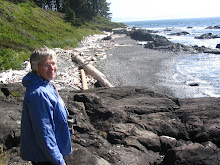 Image via Wikipedia
Image via Wikipedia
According to the Wikipedia article, You Tube was created in 2005 by three men. Before that time, it was very difficult to upload video to the internet. In 2006 You Tube was purchased by Google. Their slogan is Broadcast Yourself.
It reminds me of a news item I saw last week. In London, in Trafalgar Square, there are three statues with a plinth set up for a fourth statue. The plinth or base has been there for several hundred years. Now people can book a time to go and stand or sit on that plinth for one hour. There is a safety net around the edges. They must climb a ladder or something to get up there. Some people make speeches up there. Some just put on a show. It seems to me that You Tube and video sharing offers people around the world the opportunity to mount their own plinth and share their thoughts or images with the world. Again, going back
 Image by wallyg via Flickr
Image by wallyg via Flickr
Now the quicksand on either side of the stepping stones is a mixture of ethical issues and access issues. There are copyright issues. With the huge volume of uploads every hour, You Tube cannot guarantee that everything uploaded is the personal creation of the person uploading it. Another issue is the privacy issue. There is a way for Big Brother (so to speak) to keep track of the videos you are watching. You Tube has even been asked for that data although I don't think they shared it, except very generically. Another issue is the issue of inappropriate content. For example, when I was looking at recent and most viewed videos yesterday, one of them (some kind of distasteful spoof) had a guy get his head blown off. I stopped it at that point, but what if it was a student watching that video-----gross. That brings me to the last area of quicksand--access to You Tube. Most school boards block access to You Tube so that even those beautiful, sturdy, priceless stepping stones are inaccessible because of the surrounding quicksand. (Kind of like throwing out the baby with the bath water, isn't it?) When I tried to go on Teacher Tube, it was so slow. Then when I got into it the user interface was not as friendly as You Tubes. The videos I looked at were so earnest and educational--frankly quite boring. I'm sure there are lots of great videos there but I wasn't impressed. Maybe You Tube will have to create a You Tube School site with tight controls on it. Similar to Google now hiving off into Google Maps, Google Scholar, and Google ____________ (you fill in the blank), maybe You Tube will have to do that as well.
As I have been thinking about Web 2.0 tools and especially You Tube over the last few days, I keep wondering why it is that people are so willing to create videos and give them away for free. People also create songs and documents and put them up on the internet. I spent hours creating my photo array for Flickr. Why? I think it has to do with "agency" Human agency is the capacity for human beings to make choices and to impose those choices on the world. (Quote from Wikipedia) In the past, the official media presented the news in their way and with their own biases. Now people have the choice to influence opinion and to make a difference. Just think about that country singer with the damaged guitar (see previous blog post). For months, he was trying to change bureaucracy and be given a voice. Once he posted his song to You Tube, United Airlines finally offered him some compensation.
Now the public can say to official media, "You don't tell me the news. We make the news." I'm sure it makes people working in newspaper, television or radio very concerned because the public is scrutinizing their every move. For example, yesterday I watched Global news showing Stephen Harper coming late for a photo opportunity with the other G8 leaders. Then on You Tube, I saw that someone had posted a video to show that it was another leader (I think it was the French president) who was late and Stephen Harper had been there on time. Media can be manipulative. However, as one article I read said, You Tube uploaders also have their biases and can seek to manipulate public opinion as well.
I watched a little of the Michael Wesch video. I loved his quote from Stephen Weiswasser from ABC in 1989, "You aren't going to turn passive consumers into active trollers on the internet". He thought he had his captive audience pegged. How wrong he was?
So what are some of the implications for You Tube and other video sharing sites as a teaching and learning tool? I believe (although I haven't totally figured out how to do it) that there is a way to imbed a You Tube video into another location away from the You Tube site. If this is possible, You Tube videos could be used in a very controlled manner with students. The How-to videos referred to in the last post, would work well with upper elementary and high school students. You could even do jigsaw learning in which each group goes to view a different video. Then they could reconfigure the groups and come back to share their learning. Even the Library of Congress is getting into the act with videos. They even have a video (probably orginally a film) made by Thomas Edison. They have lots of archival video. This would be great for historical research.
Students could make videos to be uploaded to You Tube. This would give their creations a wider audience than just in an assembly. For example, at our school, there was a movie making club for the grade 7 and 8 students. We had an assembly and viewed the movies. However, I don't know whether the teacher uploaded them to You Tube or not. There is also a slide share site for placing slide shows on. I think this would be more my speed because I am comfortable with creating Power point presentations.
On the 100 You Tube Videos for Librarians page, just reading over the topics gave me more ideas for using You Tube in libraries. One library had a summer reading program for teens in which teens created videos which were prize winning. Videos were also used by many libraries to promote libraries, give tours, or give tutorials for using the library tools. Some libraries used videos to document the participatory design devices in which they sought patron
 Image via Wikipedia
Image via Wikipedia
I am very excited about You Tube. I knew very little about it before the last few days. I think some of the quicksand issues will be resolved. The stepping stones will grow larger and safe. In a few years, I hope I will be able to take students, within a school setting, across the stepping stone path without fearing that they will slip off into the quicksand.
![Reblog this post [with Zemanta]](http://img.zemanta.com/reblog_e.png?x-id=21771a53-a09f-4fbd-b561-ef04fa4be55f)





Hi Ruth.
ReplyDeleteYou wax so philosophically in your blog post. I love it. I also love your analogy of YouTube being like a "plinth"(never heard of it before), where anyone can command centre stage before an audience of one or a million. Since YouTube is so fraught with danger/quicksand all around, then can moderated sites like TeacherTube and SchoolTube serve as pliths as well as YouTube does?
Tony
That is a great question, Tony. Youtube works because it is easy - some of these other more "educational" sites are a lot less so.
ReplyDeleteWe need to work on making sure that we have Web 2.0 tools that work for kids (and teachers). I think students would love to share their knowledge on youtube - and then send friends, grandparents and parents to the site. When we get into privacy issues, however, and FOIPP we have more questions than answers.